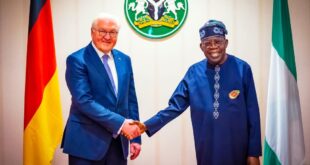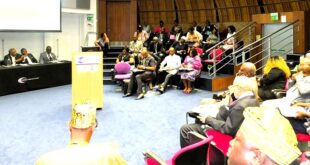Afrika-Verein demands more action from the German government as Uganda’s President Museveni makes case for investing in Africa.
The federal government must do more to encourage a greater engagement of German companies in Africa, demanded Dr Stefan Liebing, chairman of Afrika-Verein, at this year’s German Africa Business Day in Berlin. He called for the removal of hurdles preventing German companies from doing business in the continent.
In the view of German companies, the risks of doing business in Africa must be lessened through state guaranties, Liebing said at the event. He described as a paradox that government expects German businesses to be more active in seeking foreign markets but at the same time offers the weakest guaranties among all OECD countries.

Liebing also pointed out that state guaranties for investments in Africa were the worst compared with other regions of the world. “Investment in Africa needs the sharing of risks between the private sector and government,” he said.
“An increased presence of German businesses is in our own interest because the African markets are becoming more important too,” he added. “While German exports to America or Asia declined in 2015, exports to Africa rose by 1 billion euros.” He also revealed that German investments in Africa had doubled in the past ten years.
Liebing said the current global developments such as the fall in commodity prices could prove to be an opportunity for German companies. He noted that the current low prices of commodities on the world market should not deter investors, explaining that while 15 countries were suffering a drop in their export earnings, 40 others were unaffected and were even profiting from lower energy imports.
Moreover, to lessen the dependence of their countries on commodity exports, governments of oil-producing lands across the continent were making efforts to diversify their economies, he explained. “To do that they need a modern agriculture, better roads and reliable electricity supply – areas in which German expertise is in great demand,” Liebing pointed out.
Liebing said in view of the refugee crisis, it was now very important to support efforts that can lead to the creation of jobs in Africa. “Promote trade with Africa instead of aid.”
German African Business Day takes place once every year and focuses on the economic relations between Germany and Africa. Special guest at this year’s event, which took place on 2 June, was President Yoweri Museveni of Uganda, who said that investing in Africa was the wisest decision Western companies could make.
Citing figures, he pointed out that Africa was the least populated continent and currently has a high population growth rate. About 60 per cent of the world’s unused arable land is in Africa and the continent is also rich in many mineral deposits. These facts, the president said, show that Africa offered opportunities for investors with eyes on the future. “Africa is the continent of the future as far as business is concerned.”

Museveni, who has been in power since 1986, declared at the conference that Uganda had now solved the problem of inadequate electricity supply. “Uganda will never have electricity deficits ever again,” he assured. He also pointed out that the state of infrastructure, especially roads, was now in a much better shape. The president said when several ongoing projects, including a standard gauge rail line connecting the Kenyan port city of Mombasa and Uganda’s capital, Kampala, are completed, mobility will have greatly improved in the country.
Museveni predicted that Uganda’s economy will grow in double digits in the near future when all its ongoing infrastructure projects are completed. He cited the incentives being offered by Uganda, Africa’s biggest coffee exporter, including zero taxation of the materials used in manufacturing and a non-bureaucratic investment approval regime. The president said opportunities for investment in Uganda include grain milling for the manufacture of livestock feeds, food processing, textile manufacture, vehicle assembly and manufacture and herbal pharmacy.

With a population of 40 million, the east African country has one of the fastest growing economies in Africa. Under the 30-year tenure of Museveni, Uganda’s economy, driven by strong private consumption, has constantly grown and now boasts a gross domestic product of US$25 billion. Factors speaking for Uganda as an investment destination include a growing population, low inflation, and big projects including ten new cities, irrigation projects, a high-tech city, ten new airports and training centres.
Femi Awoniyi
More about Afrika-Verein and its activities at: www.afrikaverein.de
 THE AFRICAN COURIER. Reporting Africa and its Diaspora! The African Courier is an international magazine published in Germany to report on Africa and the Diaspora African experience. The first issue of the bimonthly magazine appeared on the newsstands on 15 February 1998. The African Courier is a communication forum for European-African political, economic and cultural exchanges, and a voice for Africa in Europe.
THE AFRICAN COURIER. Reporting Africa and its Diaspora! The African Courier is an international magazine published in Germany to report on Africa and the Diaspora African experience. The first issue of the bimonthly magazine appeared on the newsstands on 15 February 1998. The African Courier is a communication forum for European-African political, economic and cultural exchanges, and a voice for Africa in Europe.






























